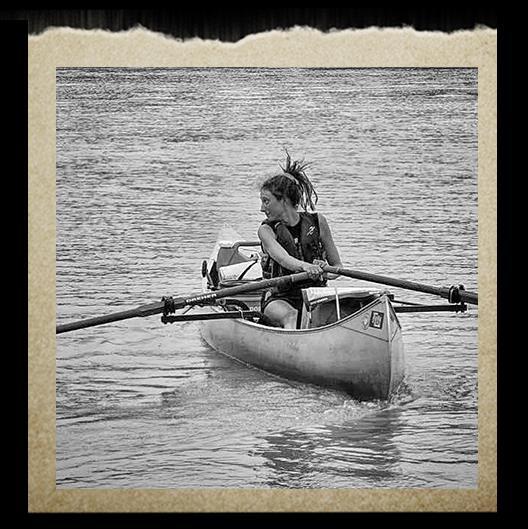
26 minute read
Interview: Ellen Magellan
I rowed the Mississippi, a journey that ended up being broken into two sections. Because halfway down the Mississippi, my grandmother became ill with cancer and I got off the water to go be with her. She passed away a few months later. At this point, I was already planning what I would do after I finished the Mississippi River - the ocean. I already knew I would be getting a different boat. Before my grandmother passed, I asked her if I could name my next boat after her, and she said that would be nice. So my ocean rowboat is named Eve - which is short for Evelyn. I know she will be with me in some way at sea.
The next year, I still had ½ of a river unfinished, and an ensuing journey along the coastline to my childhood home in Texas. So I picked up where I left off in my rowing canoe - named Edna after my other grandmother - and rowed down the rest of the Mississippi River, then west about 500 miles along the coastline to Texas. I finished my expedition in a river in East Texas. I ended the trip in the same spot on the water where my brother Patrick had died. It was a full circle that I had never planned, but was clear to me had been the plan all along. I was just following the water.
Advertisement
When did you first come up with the idea to row around the world?
When I was rowing on the Mississippi, I thought a lot about the ocean. After all, that was where the river was going. I thought about what my next expedition might be. I felt the urge to be off the rivers, and graduate to salt water. The Mississippi ends in the Gulf of Mexico, so I thought perhaps I could do a lap of the Gulf. I determined it would be wise to get an ocean-going vessel; there are two open-water crossings I did not feel confident doing in a canoe, not to mention the miles of surf I would have to launch in and out of, should I be in a boat I couldn't sleep in. So a bigger boat was in order. Well, I thought, if I get a boat that's capable of traversing Open Ocean, why stop at the Yucatan? Why not keep going south? And if I get far enough, I can make it to Panama - then I can go through the canal and I can be in the Pacific. And if I'm in a boat that's capable of Open Ocean, I can cross the Pacific. And at that point I'm almost ⅓ of the way around the world...if I just keep going west, I could row until I'm all the way back to where I started. That's not impossible at all.
That was literally my thought process.

‘If I go far enough and long enough in one direction, that makes my destination the very place I am traveling away from. There's something hopelessly poetic about that’.
This trip quickly became so much more than about me. This trip will gain attention, and if you have attention, you have the mic. When I realized that, I understood why I was on this path. This is where I have the opportunity to say something that can create real change with my time here.
A big one that is always on my mind is the future of our planet. It's the source of a dull, throbbing anxiety that I think is present in everybody, whether they are aware of it or not. I feel guilty all the time. For driving my truck, flying an airplane, using plastic and throwing away trash I know I will see in the river next time I go out for a row. I pick up trash when I'm on the water, but then feel a heaviness in my heart as I take that trash home and throw it in the garbage. Did I just move that trash around? What are we doing? We are smarter than this.
Knowing that I will have the opportunity to rally people into realizing these things, into doing something about it on an industrial level, on a corporate level - gives me a sense that I am doing my part to change the world. I am doing something not just for me, but will be helping raise the volume on the voices of the millions that cry out each day for our planet. I am not saying anything new about sustainability. But maybe because I said it, this woman alone on the ocean, someone will finally listen for the first time.
In addition to our Mother Earth, I also hope to show that women are not second. In our patriarchal history, there has always been the first person - followed by the first woman. Why can't women be on the same level as men? Why do we get paid less for the same job as a man? When I'm flying my airplane, why do I get treated at airports like less than, or even more insultingly, as a passenger? I get judged on my abilities as a woman, not as a person. If I mess up, then all women have messed up. If a man messes up, then just that man made a mistake.
If I go out and I do this thing that is physically and mentally a huge challenge, I don't know what else I can do to show that women are capable of anything a man can do. We are not second. We just want to be seen as the same. Nobody chooses the bodies they get to live in. So don't judge for something someone can't control. That goes for gender, for race, for physical appearance of any kind. We are just souls in bodies. See people for their soul, not the thing their soul lives in. We can start with women, but the implications extend to equality for every person.
Lastly, I hope to make people examine their own lives: This is my dream, and it is seemingly impossible. What is your dream? What have you always felt is your path? What do you think you were given a life for? Your existence was not by accident, or random. You in particular have a purpose. You have a vision. It might be the scariest thing you've ever done to begin to execute your vision, but nothing easy is worth doing. If I can go out and live my path - which is huge and terrifying in many ways - then you can take that first step on your true path. Don't waste your life walking down a path others put you on, or one you just sort of ended up on. Take active steps to walk your own path, your own purpose and dream. If everyone lives their true purpose, the world will become a better place.
Listen to yourself and pay attention to the signs; they will show you the way.
What were you looking for in a boat to undertake this journey, what boat have you chosen and what are the key features to come to this conclusion and adaptations that will be made for this expedition?
Step one in executing this expedition was securing a boat. The boat was the base of my plan, and only until I knew what it would be and where it was could I move on to thinking about what I would put in it and how I would get around the world in it. This is where Rannoch comes in…
I realized very quickly that these guys had this stuff figured out. I was just looking for a boat that would do its best to keep me alive. When I am being tossed about on para anchor, I wanted to know I cut no corners when it came to the boat. Which means I have to put an immense amount of trust in whoever built the boat. Rannoch were people I could trust. So I bought an airplane ticket and right before Covid surfaced, I took a visit to the UK by myself. I stayed in the little quaint town of Burnham-on-Crouch. I took myself exploring in the area, I made friends with people at the local pub...and I met the boats and the boat-builders. This felt like the right spot.
I had a little binder with some blank maps I had printed out. On them I had gone through with coloured pencil and outlined my route: estimates on distances, time, and seasons. The owner of Rannoch Charlie Pitcher and I had breakfast and he stared at my binder silently for a full minute before telling me nobody has ever done this before. "I didn't know that." I said. He seemed enthusiastic about my proposal, told me it was indeed possible, and showed me the boatyard. I looked at some boats and he offered me a used boat that hadn't seen much of the world. She looked right to me, and the match was made. The most important feature was that she was selfrighting, but all Rannoch boats are designed that way. She is a two-person rowboat, but could be converted into a solo rower by making the fore cabin storage storage I would need for the Pacific crossing. To make her ready for the world, the boat would need a new watermaker and some additional modifications. A tworudder system was devised, where I would have a coastal rudder, and then a larger one for Open Ocean. A reinforced keel for coastal docking was discussed. Electrical system needed to be enhanced just for the sheer length of the voyage. I have some other ideas including: locks on the cabin for being at away from the boat at port, emergency hand pump on underbelly for potential failure of the self-righting design, ability to adjust rudder from rowing station for potential failure of the autopilot, among some other things that have come to mind since I last visited Rannoch.
I'll know more about the boat once I visit Rannoch again, but the plague has kept me away. Ask me this question again when I have hands on boat and I'll have more technical things to say. It's hard to get to know a boat that's an ocean away, but I trust Rannoch to take care of her until she comes home. Then she's mine to get to know and modify further.
“When someone flies half way around the world to meet you and talk boats, you know they are serious. After being with Ellen for a short time, I knew she was very SERIOUS! For someone of Ellen's age, I do not know anyone with as much experience with boats and planes. Being a Pilot Instructor, she obviously knows how not to get lost, important when circumnavigating the planet!
After deliberating with Ellen, we showed her a boat that was super solid and safe, but with decent space below and relatively lively, a boat that would look after her in bad weather, but help her along at speed with fair winds.
We are refitting it to allow for all scenarios she may come across like beaching it or living aboard for months at a time without help, what we call "off grid" with emergency Satellite communications availability. We look forward to helping this strong minded and determined young Adventurer realise her lifetime dream....rather her than me though!!"
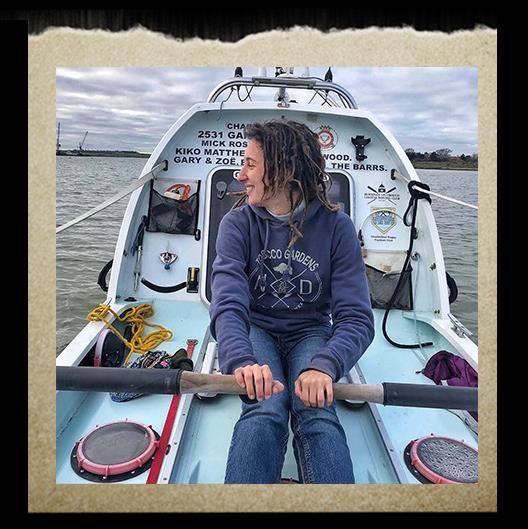

Charlie Pitcher Founder of Rannoch Adventure
One pull at a time.
Physically, I have to make sure my body has no major injuries or flaws. I've seen a couple of specialists in the matter and had some procedures to fix a few small things that could become big things on the ocean. I have to make sure there are no dental problems, joint or muscle issues, circulation problems, breathing issues. Basically, I have to inspect my rowboat motor, just like I would any other piece of equipment.
And it has to be strong. I'm a 105 pound woman, so I can only be so physically strong. While I can train for strength, what will help a lot with horsepower is technique. So I'm fine tuning that, and learning about how to row well. I have to work smarter, not harder. All I have right now is my rowing canoe to train, so we go out as often as possible. When I can't get out on the water, I remain fit by jogging, cycling, or doing circuit routines. Once I have my ocean rowboat, I'll train in her. I'm not training for a race - I'm training for a row. Here on land is where I train enough so that I am as safe and efficient as possible, but peak fitness will come during the row.
Mental training is sea school, and everything that entails. I plan on going to Dawn Wood's Row Aurora school and taking the weeklong course. There I will learn many things including: navigation and plotting, medical skills, emergency procedures, and get a radio licence many things I teach my own students, but in aviation. I'm excited to see how my experience as a pilot transfers over to the ocean. I like to think about how the original technologies used in aviation were maritime concepts sailing knowledge becoming aviation - and I'm transferring the other way around.
I have to give pep talks to my students often, when they get overwhelmed about learning how to fly. I'll land the airplane and they say, sometimes a bit grudgingly, "You make it look so easy!" And I always respond with, "Anything is easy if you know how." Like anything, I just have to learn how.
Other preparations involve spending a lot of time in front of a computer. Research on seasonal winds and currents, storm seasons, optimal routes, ports of entry, passport and VISA requirements, paperwork and documentation, docking, insurance, food, customs...the list goes on. I'm not just planning a row across one ocean - the scale of this trip makes logistical planning a major factor to making this a success. I don't plan on breaking the expedition into chunks and returning home. I want to leave and never come back until I'm rowing back. I will have to spend several months at a time waiting on storm seasons to pass, waiting on supplies or gear, fixing the boat...there's a lot of things that could go wrong, but if I'm in no rush - which I'm not - then with time I'll figure it out. I always do. The other part of the preparation that nobody likes to talk about is funding. But like with logistics, it's something else that can discontinue the expedition. Here I've had to buckle down and learn how to do a lot of things I don't want to do. Route planning is fun. Boat stuff is fun. Finances are not. I've had to create a non-profit, a website, logo, merchandise. I've had to become an accountant, a tax specialist, a solicitor. But I didn't do it all alone. I have my board of directors involved in the non-profit, and my truly wonderful sister-in-law is a graphic designer. She is the one behind the website design, logo, merchandise, online purchasing...really all the programming. I write the words, keep the books, and hold everything together legally, but she is the whiz behind the computer. I do a lot of things alone, but not everything.
There is a lot of preparation that goes into an undertaking of this magnitude, and this part that I'm doing now is more torture to me than being behind oars all day. This is the gauntlet. But if it were easy, everyone would be doing it. It's not impossible. It just takes wholehearted commitment, courage to face the unknown, a willingness to grow, and a big ole’ deep breath.
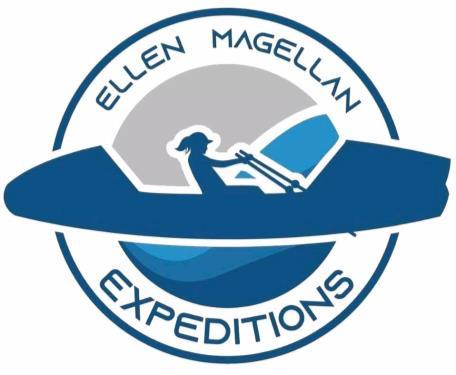
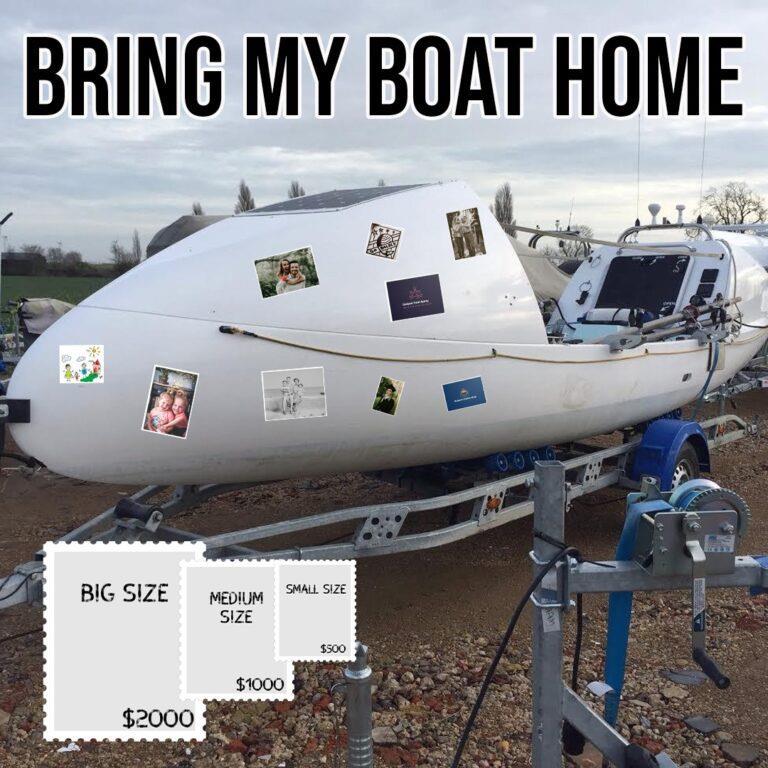
In addition to apparel merchandise, you can travel the world with Ellen by designing your very own boat sticker and send your stamp around the world! Click here to find out more.
What route will you be taking?
The route: I'm departing from my home - the Gulf Coast of the United States. There I'll have to hack my way south against the crosswinds to Panama, and go through the canal. Instead of trying to go down to Peru from there against the current, I plan to leave from Panama and catch the trades across the equator, through the dreaded doldrums, and land in French Polynesia. Carefully picking my way through the numerous islands and atolls of the South Pacific, I'll make my way to mainland Australia. I then plan to go across the northern side of Australia, and depart across the Indian east to west, landing in South Africa. After rounding the windswept horn, I'll leave across the Atlantic on a north-westerly heading, and land in Brazil. From there, I can make my way back to the Caribbean, and return to my home waters of the Gulf of Mexico. Sounds so nice when you lay it out like that, but it will be a journey of around 6 years and about 35,000 miles. That's ok; I'm giving myself plenty of time to take it slow, make calculated decisions, and play it safe.
Replenishing: A careful dance with customs and mail. I'll be living mostly off of freeze dried food, which won't be available at every port. So I'll have to get things mailed to me by my ground crew back in the States, and make sure it clears customs at the time I need it. I can also get food locally: snacks, non-perishables, whatever I can find in a local grocery that I think would last on the boat.
Resupply stops will be carefully calculated; it is a big deal to make landfall, and an even bigger deal to leave land during a fair weather window. While at port though, I have the opportunity to meet the local people, and find ways I can send a message of sustainability, show what women can do, and inspire people to make changes in their own lives and their community. If there's one thing I've learned in my travels so far, it's that the people you meet along the way are the most important part of the journey.
To view the route on Google Earth, Click Here.
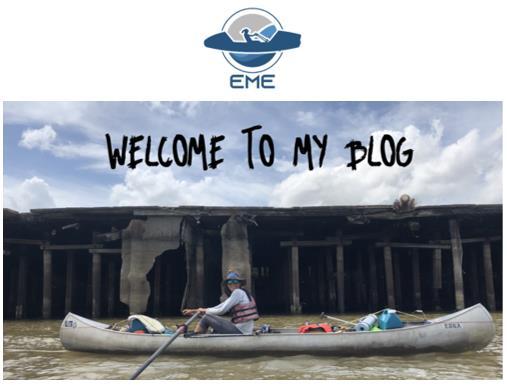
Ellen regularly shares her stories and experiences on her blog where you can follow her progress.
To view her blog, please click on the image above.
What are you most looking forward to?
The average day. The day where everything feels comfortable, where I have a rhythm and a method and an answer for everything. My mind is calm, and I am rowing my boat. I might be hungry, I might be wet, I might be sticky with salt. There might be things on my boat that are broken. I might feel like I'm in a dream. But I woke up, I did my day, and I went to sleep. The feeling of this is normal, this is my life, and I am comfortable with the uncomfortable. I am captain of this floating island, and I know how to survive here. I am looking forward to feeling like I finally have a home again.
The average day. The day where nothing feels comfortable, where I feel like I'm flailing my oars uselessly against water that only laughs back. My mind is static, and I feel like dying. I'm hungry, I'm wet, I'm tired and I want to stop rowing forever. My boat has more broken things than working things. I'm using all my backups. I feel like I'm in a nightmare. I don't know what is real and what isn't. I can't escape. The feeling of this is crazy, this is not right, I shouldn't be here. I am looking forward to encountering the storms of my mind, and finding out what I'm really made of.
When I return, I'm looking forward to looking back and seeing what kind of imprint I made on people. I'm looking forward to hearing how I have inspired someone to change their life. I'm looking forward to the end, but not because I want it to be over. I want to see how the world has become a better place, because of something I did. And in the end, that's all we're really here for. To better the world, and to help each other.
What are you least looking forward to?
The logistical dance. The paperwork that will follow me while I'm at sea. The unrelenting port authorities that point me in directions I can't go easily. Invisible red tape. Barriers of society that I have to navigate as a human in a world of structure and rules. The anxiety that I'm missing some crucial piece of paper to let me ashore. Paperwork back home that needs my attention. The thought that things might crash and burn while I'm gone. But all this is navigable, and all this can be mitigated with enough planning on the ground before I leave. The things I'm least looking forward to are things I can do and research right now. But these invisible barriers of society make me more anxious than the largest wave.
How can one follow your journey?
www.ellenmagellanexpeditions.com
If you sign up for the newsletter on the website, you'll receive one email a week every Saturday at 1400 Zulu. This is the best way to get to know me; it's a newsletter in a very loose sense of the word. It details my thoughts for the week. You can check out the Archives to catch up at: https://www.ellenmagellanswag.com/blog/
Click on the below to visit Ellen’s social channels:
BLOG
How can one support your expedition?
I've got these customizable boat stickers for sale. Basically, you can put any image you want on my boat. A photo, a name, a drawing, a painting, a doodle, a design, even a logo. And that image goes all the way around the world. I'm calling them "stamps," and they will look like postage stamps, except bigger. Choose from a variety of sizes. This is so that individuals that want to contribute more than a little get something in return. It is also an opportunity for small businesses that can't afford to be a corporate sponsor to get their logo on my boat at an affordable price. What image would you want to show the world?
Click Here for Ellen’s Customizable Boat Stickers
I've also got merchandise, some fun stuff like hats, Tshirts, and mugs with my logo on them. A few of my merchandise items have "Find your river" on them in my handwriting, and people seem to really like those, too. Spread the message and support this expedition at the same time! I have to admit, I was impressed by my printing company - these shirts and things are well fitted and good quality. Not your usual cruddy fundraiser Tshirt:
Click Here for Ellen Magellan Merchandise
And I've also got a straight-up donate button. Don't want a stamp, don't want merch, just want to give something and say, "Good luck and good job?" Here's the link for you:
https://donorbox.org/ellen-magellan-expeditions
Thank you! Let's go around the world, together!
Ellen Falterman
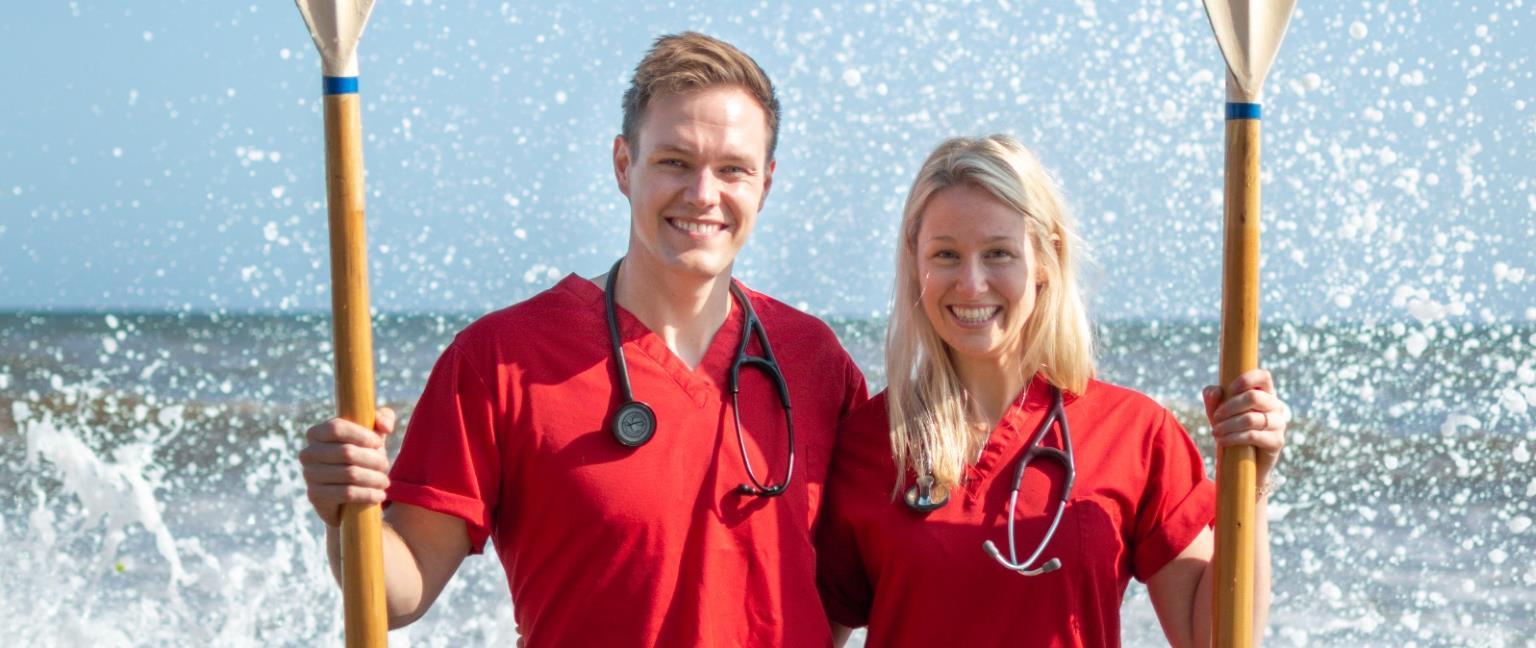
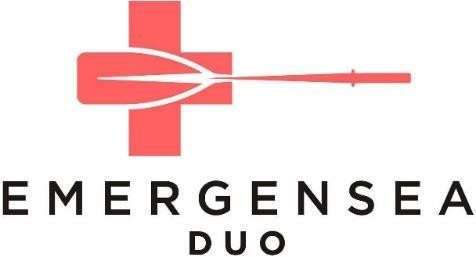
Who are the Emergensea Duo?
We are Charlie and Adam, two Emergency Medicine doctors from Exeter and a married couple trading A&E for the sea and taking on “the World’s toughest row”, the Talisker Whisky Atlantic Challenge (TWAC). Backed by our Title sponsor, Scilly Spirit Distillery, on the 12th December 2021 we will depart from La Gomera in the Canary Islands on Percy our 24ft ocean rowing boat and begin an unassisted 3000 mile row across the Atlantic Ocean, towards Antigua.
How did the journey evolve into signing-up to the Talisker Whisky Atlantic Challenge?
The idea evolved whilst we were on a polar expedition in Norway with World Extreme Medicine as part of our Extreme Medicine Masters degree. The MSc fuelled our desire to undertake an extreme mental and physical challenge and, since we both love the water, we decided to participate in the Talisker Whisky Atlantic Challenge. Undoubtedly we will face challenging situations out of our comfort zone and we believe this will be a life changing experience for us.
Are you aiming on breaking any records? What message are you wishing to portray by undertaking this challenge?
We really want to inspire people to push past their selfperceived boundaries and find their own ocean to cross. There is no denying that this last year has been incredibly tough for everyone but there are adventures out there for us all. It’s also really important for us to promote equal participation in ultra-endurance events. At present these events are dominated by male participants, however, there have been some recent remarkable female performances, outperforming their male counterparts, demonstrating that females may be better adapted to ultra-events.
Do you have any prior rowing and/or endurance experience?
Although neither of us have rowed before, Charlie was a Naval reservist so has many nautical miles under her belt. We both love the water; we enjoy open water swimming, diving and paddle boarding so we are really looking forward to taking on this new challenge. Between us we have completed an Ironman 70.3 and have swum the height of Mt Kilimanjaro. We also both feel that A&E nightshifts are a special type of endurance event in themselves!
We are currently planning a long row to the Scilly Isles to meet up with the Scilly Spirit Distillery team who have assured us their island gin will help us “discover Atlantic strength”!
Our goal is to beat the mixed pair world record, which currently stands at 43 days 15 hours and 22 minutes. The world record for the fastest ever mixed team, is currently held by a team of four who completed the race in 42 days 10 hours 26 minutes, so we will push to beat this too! We will also be the first married couple to take part in the Talisker Whisky Atlantic Challenge.
Which charities are you raising money for and what are your reasons in choice?
With our work we wanted to select frontline medical charities that encompass saving lives by air, land and sea.
We have had the pleasure of working alongside the The Devon Air Ambulance this year and have seen first-hand the incredible critical care they bring to the patient’s side in challenging environments across the South West. We chose the Royal Devon & Exeter Charity which raises money to make a difference to patients, their families and hospital staff and is currently raising money to develop the paediatric areas of the hospital and the RNLI who optimise “ordinary people doing extraordinary things” along our epic coastlines. Working through the pandemic has highlighted the importance of mental health both for frontline workers and the community as a whole. Having seen a rise in mental health presentations we are committed to raising funds for Mind too.
As medical personnel, I can imagine it’s been a challenging year - what has your experience been dealing with this Covid-19 situation?
It has been a very challenging year for everyone. We were very nervous at the start as we did not really know how COVID-19 would hit us and in the early days there was only anecdotal evidence for the best way to treat patients. It has been heart-breaking having to deliver news over the phone and losing the personal touch with our patients and their loved ones.
We have had to become used to learning new protocols quickly and adapting to the difficult situations. It has been a real rollercoaster of emotions, from the humbling clap for carers in the first lockdown and seeing the community rally behind the NHS. Progressing in later lockdowns to being filmed and berated at work by individuals who believed we were part of a wider conspiracy hiding empty hospital beds. The increased anxiety has been palpable but we continue to take each shift in our stride and deliver the best possible care in these capricious times. We are both so very lucky to work in a team of fantastic people and have support from the community to help us through.
Will you be conducting any medical studies and research as part of your row?
Yes! Charlie has already carried out a preliminary study on the ocean rowers from a previous race looking at the physiological changes between males and females before and after the event. We aim to repeat this and also to focus more on the psychological aspects using ourselves as guinea pigs to collect this data during the row. Being a mixed pair in an identical situation makes it very interesting from a scientific point of view as we will be in the same “test conditions” and currently many of the studies are carried out in labs mimicking event conditions. We feel that collecting this data real time will address the current gap in the literature.
What is your current understanding of on the research of Atlantic rowers performing ultraendurance?
Currently there is very little published data available on ocean rowers with the majority of ultra-endurance research carried out on ultra-marathon runners. It is a well-known fact that ocean rowers lose a significant amount of body weight on this row, around 10-12%. From our preliminary research we observed that females lost a smaller percentage of their pre-race mass, most of which was fat and with preservation of muscle mass in comparison to the male participants. We believe this could make them better adapted to ultraevents, with other studies supporting this.
The number of females participating in TWAC is steadily increasing year on year which is fantastic but is by no means equal with a much larger male group. We are hoping to promote equal participation in ultra-events through this work by showing how females may be better suited to ultra-events.
What experiments and recording of data in the physiological and psychological differences between males and females in ultra-endurance events.
The data we will be recording will be multiple muscle measurements, body composition analysis before and after the row and a number of psychological questionnaires to look at how our mood changes throughout the race and how our psychological state effects our fatigability and exertion efforts.
© Emergensea Duo







